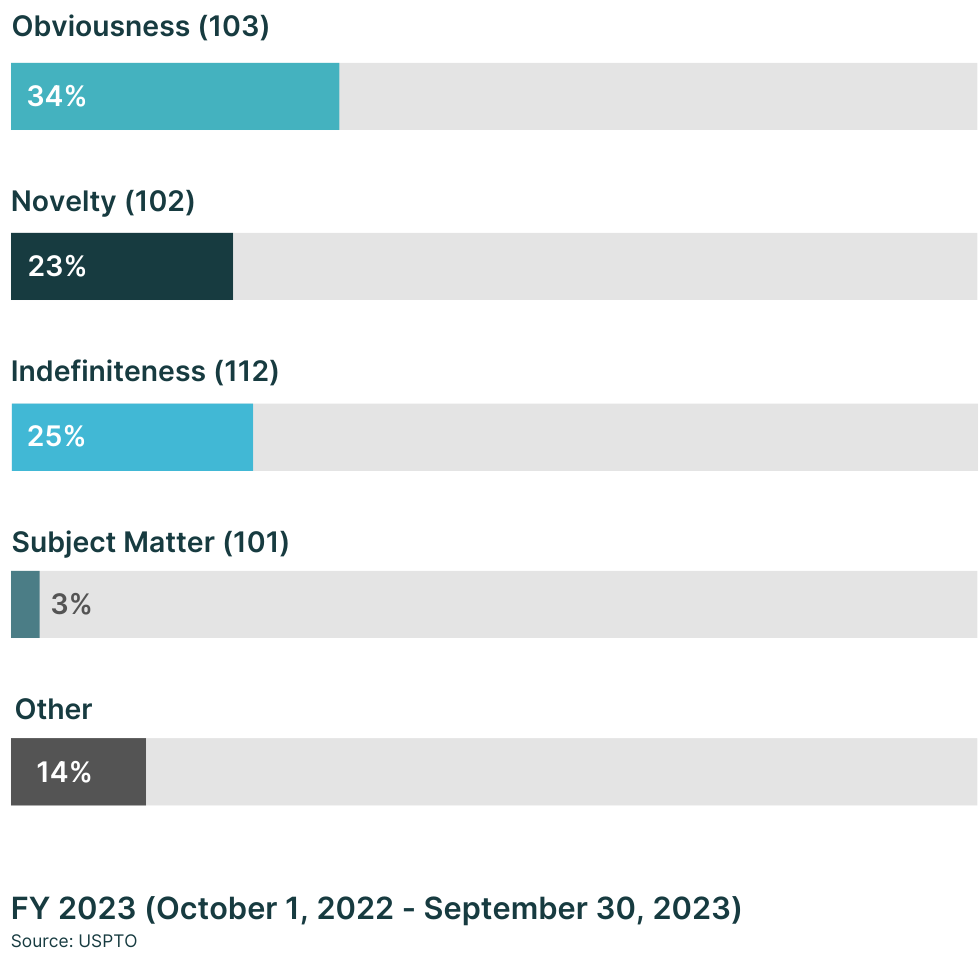A patentability search, also known as a novelty search, is a type of prior art search that helps determine if an idea or invention satisfies the patentability criteria of novelty.
A patentability search is an important step that each inventor or innovator must consider before investing significant resources in the patent application process, or even at the early stages of research and development.

In FY 2023, the USPTO Rejections in Office Actions show that 26% are 102 (novelty) rejections, while 35% are obviousness rejections. This further underscores the importance of performing a patentability search or novelty search before embarking on the patent application process.
Get access to a network of patent experts

From patentability opinions to patent filing and prosecution support — our network of experts offer valuable insights regarding claim language, novelty, non-obviousness to help you craft stronger claims and explore design-around options.
Parola provided us the key reference
The first search Parola Analytics, Inc. performed for us provided the key reference supporting our invalidity position on a patent we were evaluating.
High quality prior art search results with minimal oversight
Vincent Violago and his excellent team at Parola Analytics provide high quality, detailed, prior art search results with minimal oversight and handholding.
These guys are highly educated and experienced in their field and work together with great efficiency. The work product is top-notch, and they are always available for follow up.
Demonstrated deeper understanding of the search
I engaged Parola Analytics to conduct a prior art search on a difficult US patent that had already stymied another search firm that delivered two unusable references.
Parola found four much better references in two weeks that demonstrated a deeper understanding of the search and an effective selection of the best references.
Our trusted partner for prior art search
Parola Analytics is our trusted partner for prior art search contests on PATROLL, Unified Patent’s crowdsourcing platform. With their expertise in prior art searching, Vincent and his team at Parola Analytics are valuable partners in reviewing prior art submissions to our contests.
Parola Analytics provides broad knowledge across various subject-matters and offers competitive pricing. They are easy to work with and are responsive to our needs.
Parola delivered outstanding results!
Vincent and his team at Parola are excellent at locating prior art. We have worked with Parola on two matters, and both times, Parola delivered outstanding results. Parola’s highly-relevant search results and reports demonstrated a thorough understanding of the patent claims.
High Quality. Efficient. Reliable.
The team at Parola Analytics did an excellent job in providing us with the highest-quality prior art research service. The team’s search report highlighted the best prior art references with an easy-to-understand format. In short, the team proved itself.
We are the trusted partner of startups, solo IP practitioners, and top law firms when it comes to patentability searches.
Uncover prior art that may impact the likelihood of obtaining a patent. Benefit from a comprehensive search led by our subject matter experts, enhanced by AI-powered search tools.
Identify closest prior art and the most relevant references and disclosures to assess whether the differences between the invention and the prior art would have been obvious to a skilled person in the art
Craft stronger patent claims that distinguish your invention from existing technology. Overcome potential patent office rejections during the patent prosecution process.
Get expert opinion regarding the patentability of your invention
Get professional assistance in filing priority or provisional applications, U.S. utility, design, etc
Preparation and filing of a response to a substantive Official Action from the USPTO, appeal briefs, etc.
It is advisable to conduct a patentability search early in the invention process, before investing significant time and resources into development. This helps avoid unnecessary costs and setbacks by identifying potential obstacles in the patent application and prosecution process.
Prior art refers to any publicly available information that predates the filing date of a patent application. This includes existing patents, published patent applications, academic papers, technical documents, product descriptions, and other materials that disclose similar inventions or concepts.
The main conditions for patentability that must be satisfied are: (1) novelty, (2) non-obviousness (inventive step), (3) utility. In addition to these main requirements inventions must also fall under “patentable subject matter”. i.e. This typically includes processes, machines, manufactured goods, compositions of matter, and improvements thereof.
However, abstract ideas, laws of nature, natural phenomena, and mere discoveries are generally not considered patentable subject matter.
It is important to note that each jurisdiction may have different requirements for patentability.
No, a patentability search cannot guarantee that a patent will be granted. While a patentability search can provide insights regarding novelty, other patentability requirements still need to be satisfied i.e. non-obviousness (which can depend largely on the patent examiner). A patent application may also be rejected due to a “lack of enablement”. If a patent examiner deems the claims to be “indefinite” or vague or ambiguous, the patent application may be rejected.
A patentability search can provide valuable insights into the patentability of an invention and help strengthen the patent application by addressing potential challenges early in the process.
A patentability opinion, also known as a patentability search opinion or patentability analysis, is a professional assessment provided by a patent attorney or agent regarding the likelihood of obtaining a patent for an invention. This opinion is based on the results of a thorough patentability search, which involves examining prior art to determine the novelty and non-obviousness of the invention.
Parola Analytics has partner U.S. IP firms that can provide you with a patentability opinion based on our patentability search results.
If prior art is found during a patentability search, it may impact the patentability of your invention. A patent attorney or patent agent can help assess the relevance of the prior art and advise you on how to proceed, which may involve modifying the invention to enhance its novelty (design around) or pursuing a different strategy for intellectual property protection.
A typical novelty search report includes the search strategy, overview, databases and keywords used, and most importantly, a technical mapping of the search results.
The patentability search report presents the findings of the search, including a list of relevant prior art references identified during the search process. The features of the invention are then mapped to the relevant disclosures of each reference found.
Parola’s patentability search reports also provides insights on non-obviousness by presenting a combination of references that disclose the features of the invention (when combined).
For patent literature, you can use Google Patents, Espacenet, WIPO (Patentscope), etc.
For non-patent literature various databases such as Sciencedirect, Google Scholar, Arxiv.org and other academic and scientific journals can be used.
There are also patent and non patent databases or search engines that can be used such as PQAI. This tool is an initiative from AT&T. You can try the free patent search tool here.
Disclaimer:
1. Parola Analytics and Avontis are distinct entities and operate independently. Any references to Avontis or its services do not constitute a legal partnership.
2. Parola Analytics does not provide legal services. Our services are limited to research and technical analysis. Any information provided by Parola Analytics should not be construed as legal advice.
Get your dedicated research team now. Book a free consultation or send us a message.
Services
Links
Sign up to receive first access to our reports, the latest patent news, and other updates —
all delivered to your inbox.
"*" indicates required fields
Sign up for our weekly newsletter featuring the latest patents and innovations.
Get early access to our patent landscape and insight reports.
Disclaimer:
1. Parola Analytics and Avontis are distinct entities and operate independently. Any references to Avontis or its services do not constitute a legal partnership.
2. Parola Analytics does not provide legal services. Our services are limited to research and technical analysis. Any information provided by Parola Analytics should not be construed as legal advice.